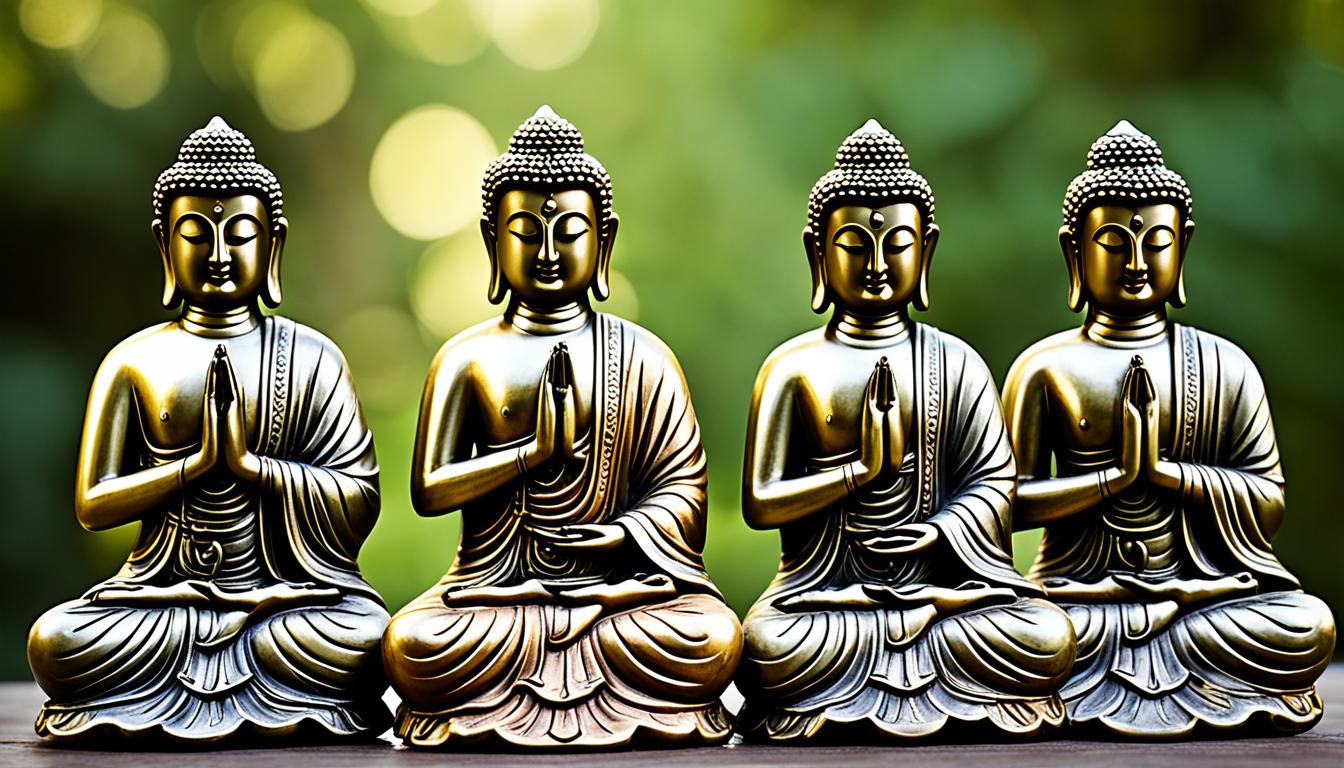“Thousands of candles can be lit from a single candle, and the life of the candle will not be shortened. Happiness never decreases by being shared.” – Buddha
Welcome to the enlightening world of Buddhism! As you embark on this spiritual journey, you will discover the profound teachings and principles that have inspired millions of people worldwide. Buddhism, with its rich doctrine and core tenets, offers a path towards serenity, compassion, and inner peace.
At its core, Buddhism is a non-theistic belief system, meaning there is no emphasis on the worship of a higher deity. Founded by Siddhartha Gautama, known as the Buddha, this spiritual path centers around achieving enlightenment and liberation from suffering.
One of the remarkable aspects of Buddhism is its compatibility with other faith traditions. It welcomes individuals from all walks of life, regardless of their religious backgrounds. The teachings of Buddhism resonate with the human desire for personal growth, societal harmony, and the understanding of the nature of existence.
This article will delve into the fundamental beliefs of Buddhism, exploring the core principles that guide its followers towards a more peaceful and fulfilling existence. Join us as we explore the timeless wisdom of Buddhist teachings and discover how they can enhance your spiritual journey.
Key Takeaways:
- Buddhism is a non-theistic belief system centered around achieving enlightenment and liberation from suffering.
- It is compatible with other faith traditions and welcomes individuals of different religious backgrounds.
- The teachings of Buddhism offer timeless wisdom and guidance for personal and societal harmony.
- The core principles of Buddhism include mindfulness, compassion, detachment, and embracing change.
- Buddhism teaches that true happiness comes from sharing and compassion towards oneself and others.
The Teachings of Buddha
Buddha’s teachings form the cornerstone of Buddhism, offering profound insights into understanding suffering and attaining inner peace. His teachings revolve around essential doctrines in Buddhism, including the Four Noble Truths and the Eightfold Path.
Understanding Suffering: The Four Noble Truths
“Suffering exists, but it can be transcended.”
The Four Noble Truths serve as the foundation of Buddhist teachings, providing a framework for understanding suffering and its causes. They are as follows:
- Dukkha: The truth of suffering – Life is inherently marked by dissatisfaction, pain, and impermanence.
- Tanha: The truth of the origin of suffering – Suffering arises from desire and attachment, the craving for what is pleasurable or the refusal to accept what is painful.
- Nirodha: The truth of the cessation of suffering – By letting go of desires, attachments, and illusions, one can transcend suffering and find liberation.
- Magga: The truth of the path to the cessation of suffering – The Eightfold Path leads to the end of suffering and the realization of enlightenment.
A Path to Mindful Living: The Eightfold Path
“Right thoughts, right words, right actions: a path to enlightenment.”
The Eightfold Path provides a practical guide for leading an ethical and mindful life. Each step contributes to the development of wisdom, ethical conduct, and mental discipline. These eight principles are:
- Right Understanding: Develop a clear understanding of the Four Noble Truths and the nature of reality.
- Right Intention: Cultivate noble intentions, free from ill will, greed, and harmful desires.
- Right Speech: Practice mindful and compassionate communication, avoiding falsehoods, gossip, harsh words, and divisive speech.
- Right Action: Engage in moral conduct by abstaining from harming living beings, stealing, and engaging in sexual misconduct.
- Right Livelihood: Choose a vocation that promotes ethical conduct and avoids harm to oneself and others.
- Right Effort: Cultivate the commitment and perseverance to develop positive qualities and overcome negative habits.
- Right Mindfulness: Develop moment-to-moment awareness, observing thoughts, feelings, and sensations with non-judgmental attention.
- Right Concentration: Cultivate focused and tranquil states of mind through meditation, leading to deep insight and mental clarity.
Buddhism encompasses more than just the Four Noble Truths and the Eightfold Path. It emphasizes the practice of mindfulness, compassion, kindness, detachment, and embracing change as essential aspects of spiritual growth and self-realization.

| Key Beliefs in Buddhism |
|---|
| The Four Noble Truths |
| The Eightfold Path |
| Mindfulness |
| Compassion |
| Kindness |
| Detachment |
| Embracing Change |
Buddhism as a Spiritual Practice
Buddhism offers a practical approach to spiritual growth and personal transformation. It encourages the cultivation of mindfulness, compassion, and detachment as essential components of the spiritual journey.
Mindfulness in Buddhism: Mindfulness is a key practice in Buddhism, involving the conscious awareness of the present moment. By observing thoughts and emotions without attachment or judgment, mindfulness cultivates a deep sense of inner calm and clarity. Through regular meditation and mindful living, individuals can develop a heightened sense of self-awareness and a greater appreciation for the present moment.
Compassion in Buddhism: Compassion is a central tenet of Buddhism, emphasizing loving-kindness towards oneself and others. By embracing compassion, practitioners develop empathy, kindness, and a genuine concern for the well-being of all beings. Through acts of compassion, individuals not only cultivate a sense of interconnectedness but also deepen their spiritual connection and experience inner joy.
Practicing Buddhism: Buddhism is not merely a set of beliefs but a way of life that involves actively practicing its teachings. This includes engaging in daily meditation, self-reflection, and self-discipline. Through consistent practice, individuals can integrate Buddhist principles into their thoughts, words, and actions, leading to personal growth and spiritual development.
Spiritual Growth in Buddhism: Buddhism emphasizes the journey of spiritual growth and self-transformation. By embracing the core teachings of Buddhism, individuals can enhance their understanding of the nature of suffering, find inner peace, and achieve spiritual enlightenment. Buddhism offers a path for continuous growth, awakening, and the exploration of one’s true potential.
The Benefits of Mindfulness in Buddhism
Mindfulness in Buddhism is a practice that holds numerous benefits for individuals seeking personal growth and spiritual development. Through the cultivation of mindfulness, practitioners can:
- Reduce stress and anxiety
- Enhance focus and concentration
- Improve emotional well-being
- Cultivate self-awareness and acceptance
- Deepen relationships and empathy
- Experience a sense of inner peace and tranquility

| Principles of Buddhism | Benefits of Mindfulness |
|---|---|
| Mindfulness | Reduces stress and anxiety |
| Compassion | Enhances focus and concentration |
| Detachment | Improves emotional well-being |
| Impermanence | Cultivates self-awareness and acceptance |
Buddhism in Daily Life
The principles of Buddhism offer valuable guidance for modern life, allowing individuals to apply its teachings to promote personal growth, well-being, and contribute to a more peaceful and compassionate society.
Applying Buddhism Principles
By incorporating the principles of Buddhism into your daily life, you can navigate life’s challenges with wisdom and inner peace.
One of the fundamental principles of Buddhism is mindfulness. Practicing mindfulness involves being fully present in the moment, observing your thoughts and emotions without judgment or attachment. By cultivating mindfulness, individuals can develop a greater sense of self-awareness and make conscious decisions that are aligned with their values.
Compassion is another key principle in Buddhism. By cultivating compassion for yourself and others, you can foster greater understanding, empathy, and kindness. Compassion allows you to develop stronger relationships, promote harmony, and contribute to a more caring and inclusive community.
Detachment is also emphasized in Buddhism. By letting go of attachment to material possessions, outcomes, and expectations, individuals can cultivate a sense of freedom and reduce suffering. Detachment helps to shift the focus from external circumstances to inner contentment and peace.
Buddhism and Personal Growth
Buddhism encourages self-reflection and self-improvement as a means of personal growth. Through introspection, individuals can gain insights into their own thoughts, emotions, and behaviors. This self-awareness enables individuals to identify areas for improvement and make positive changes to enhance their well-being.
Additionally, Buddhism emphasizes cultivating a positive mindset. By focusing on gratitude, optimism, and cultivating positive thoughts, individuals can nurture a more positive outlook on life. This positive mindset can help to reduce stress, enhance resilience, and improve overall mental and emotional well-being.
Living Harmoniously with Others
Buddhism offers teachings on how to live harmoniously with others, promoting peaceful coexistence and fostering compassion. By embracing principles such as kindness, empathy, and forgiveness, individuals can cultivate healthier relationships and create a more harmonious and inclusive society.
Buddhist teachings on ethics and morality provide guidance on living a virtuous life. The Five Precepts, which are guidelines for ethical conduct, encourage individuals to refrain from harming others, being honest, practicing mindfulness, and cultivating good relationships.
By applying the principles of Buddhism in daily life, individuals can embark on a journey of personal growth, finding greater fulfillment, peace, and contributing to a more compassionate and harmonious world.
Buddhism and Spiritual Symbols
Buddha statues play a significant role in Buddhism, serving as powerful symbols of spiritual reflection and inner peace. These statues are not just decorative pieces; they hold deep meaning and serve as reminders to cultivate serenity within oneself. Placing Buddha statues in your home, temple, or garden can create a tranquil and contemplative atmosphere, enhancing your spiritual journey.

The symbolism behind Buddha statues lies in their representation of enlightenment and the Buddha himself. The serene facial expression, elongated earlobes, and topknot are all distinctive features of these statues, embodying the calm and wisdom attained by the Buddha. The crossed legs signify meditation and mindfulness, while the gentle smile represents compassion and loving-kindness.
Buddhist temples are sacred spaces where devotees come to pay homage to the Enlightened One and engage in worship practices. These temples are adorned with Buddha statues and other sacred symbols, creating an atmosphere of reverence and devotion. The presence of Buddha statues in these sanctuaries serves as a focal point for meditation, inspiring practitioners to connect with their inner selves and seek enlightenment.
Symbolism in Buddha Statues
| Symbol | Meaning |
|---|---|
| Lotus Flower | Symbolizes purity and spiritual growth |
| Mudra Hand Gestures | Depict different qualities such as compassion, fearlessness, and enlightenment |
| Robes | Represent the simplicity and renunciation of worldly desires |
In addition to temples, Buddhist gardens are also adorned with Buddha statues, creating spaces for introspection and enlightenment. These gardens, often referred to as “Gardens of Enlightenment,” offer a serene environment for meditation and reflection. The presence of Buddha statues amidst nature’s beauty enhances the experience, allowing individuals to find solace and peace in the midst of a bustling world.
Whether in your home, temple, or garden, Buddha statues serve as powerful symbols that inspire and guide you on your spiritual journey. They remind us to cultivate inner calm, practice mindfulness, and embrace the teachings of the Buddha. By incorporating these symbols into our surroundings, we create an environment that supports our quest for enlightenment and inner peace.
Buddhism and Inner Peace
Buddhism offers a profound path towards finding inner peace amidst a chaotic world. By delving into the core teachings of Buddhism, individuals can cultivate serenity and tranquility in their lives. This section explores the practices and principles that guide us on this transformative journey.
One of the fundamental aspects of Buddhism is the understanding of suffering and its role in our lives. The Four Noble Truths reveal that suffering arises from desire and attachment. By recognizing and cultivating detachment from these desires, we can free ourselves from unnecessary suffering and pave the way for inner peace.
The Eightfold Path serves as a practical guide for ethical living and mindfulness. It encompasses eight interrelated principles that harmoniously fit together, offering a comprehensive framework for personal growth. These principles include right understanding, right intention, right speech, right action, right livelihood, right effort, right mindfulness, and right concentration.
Practicing mindfulness, compassion, and detachment are key to cultivating serenity in Buddhism. Mindfulness involves being fully present in the current moment, observing our thoughts and emotions without judgment or attachment. By practicing mindfulness, we develop a deeper understanding of ourselves and the world around us.
Compassion is another critical aspect of Buddhist practice. It entails cultivating kindness, empathy, and understanding towards ourselves and others. Through acts of compassion, we not only alleviate the suffering of others but also foster a sense of inner peace and interconnectedness.
The Role of Detachment in Cultivating Serenity
Detachment is a concept emphasized in Buddhism, wherein we learn to let go of attachments to outcomes, possessions, and even our own identities. By relinquishing our attachment to external circumstances, we free ourselves from the rollercoaster of emotions dictated by the ever-changing world. This detachment allows us to find peace within, undisturbed by the ups and downs of life.

Through the teachings of Buddhism, we discover that true peace comes from within. It is not dependent on external factors or circumstances, but rather on how we cultivate our inner state of being. By integrating Buddhist principles and practices into our daily lives, we can create a solid foundation for lasting peace and serenity.
| Practices for Cultivating Serenity in Buddhism | Benefits |
|---|---|
| 1. Mindfulness meditation | – Enhanced self-awareness – Reduced stress and anxiety – Improved focus and concentration |
| 2. Loving-kindness meditation | – Increased empathy and compassion – Strengthened interpersonal relationships – Inner warmth and contentment |
| 3. Letting go of attachments | – Freedom from clinging and craving – Release from unnecessary suffering – Greater contentment with the present moment |
| 4. Practicing non-judgment and acceptance | – Reduced anxiety and stress – Increased self-compassion – Improved relationships with others |
| 5. Cultivating gratitude | – Heightened appreciation for life – Increased overall happiness and well-being – Shift in perspective towards positivity |
By incorporating these practices into our daily lives, we can gradually transform our inner landscape, nurturing a sense of peace and tranquility amidst the chaos of the world.
Conclusion
By embracing Buddhism and incorporating its basic beliefs into your life, you can embark on a transformative spiritual journey towards inner peace and spiritual growth. Buddhism offers invaluable teachings that can guide you in understanding the nature of suffering and finding serenity in the midst of life’s challenges.
Through ethical living, mindfulness, compassion, and embracing change, Buddhism provides a path to enlightenment and harmony. By practicing mindfulness, you can cultivate a deep sense of inner calm and clarity, allowing you to navigate life’s ups and downs with wisdom and equanimity.
With Buddhism, you are invited to cultivate compassion, both for yourself and for others. By embracing compassion, you can develop loving-kindness and foster a sense of connection and empathy towards all beings. This compassionate mindset not only brings inner peace but also contributes to creating a more harmonious and compassionate society.
Embarking on a spiritual journey in Buddhism means embracing the timeless wisdom and guidance it offers. From understanding suffering to embracing change, Buddhism provides a transformative path that leads to a more peaceful and fulfilling existence. As you walk this path, you will uncover the depths of your own inner peace and embark on a profound spiritual journey of self-discovery and growth.
FAQ
What are the basic beliefs of Buddhism?
The basic beliefs of Buddhism include understanding the nature of suffering, practicing mindfulness and compassion, and embracing change and detachment.
What are the core tenets of Buddhism?
The core tenets of Buddhism involve the Four Noble Truths, which explain the nature of suffering and its root cause, and the Eightfold Path, which provides guidelines for ethical and mindful living.
How can Buddhism be practiced in daily life?
Buddhism can be practiced in daily life through cultivating mindfulness, compassion, and detachment, as well as self-reflection, personal growth, and contributing to a more peaceful and compassionate society.
What is the significance of Buddha statues in Buddhism?
Buddha statues serve as symbols of serenity and are used for spiritual reflection. They can be placed in homes, temples, or gardens to create a peaceful and contemplative ambiance.
How does Buddhism help in finding inner peace?
Buddhism teaches that true peace comes from within and remains unshaken by external circumstances. By understanding suffering, following the Eightfold Path, and practicing mindfulness and compassion, individuals can cultivate inner peace and serenity.

